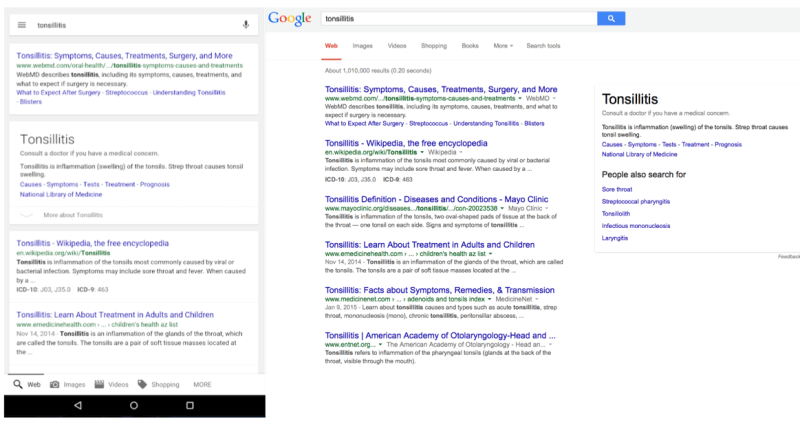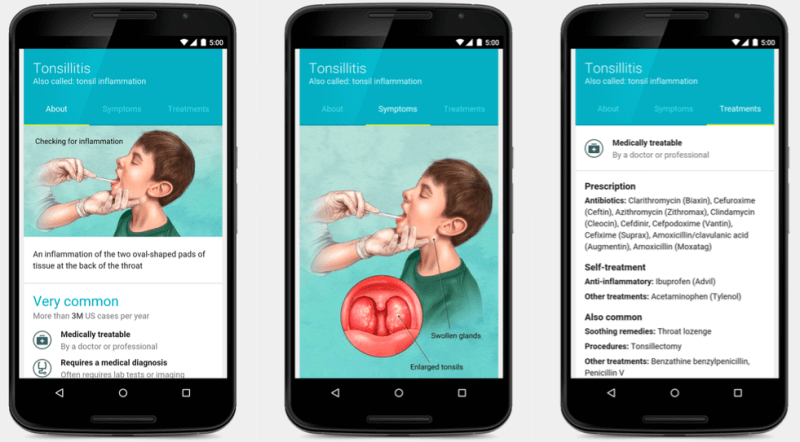Google Introduces Rich Medical Content Into Knowledge Graph
Users will soon see deeper health information for more than 400 conditions.
Google has said that “one in 20 Google searches are for health-related information.” Yet, the information available in search results can be incomplete or untrustworthy, though there are many credible sources, as well.
To improve the quality of health-related search content, Google is introducing structured and curated health information into the PC knowledge panel and info cards that appear in mobile search results. Google has tapped doctors, medical illustrators and the Mayo Clinic to develop in-depth information for more than 400 health and medical conditions.
The rollout is for U.S. English, for the time being, on the Google app (Android and iOS) and for the PC. However Google plans to expand the number of conditions and later make the information available outside the US.
The screenshots immediately below reflect current results on the PC and mobile for the search query “tonsillitis.” Soon, U.S. mobile and PC users will start to see content and imagery that look a lot more like those further below.
In its press materials for this release, Google is showcasing the mobile experience, which the company said is a primary use case for the information. It’s also an effort to promote and enhance the value of mobile search.
After collecting the basic factual information, Google worked closely with doctors in reviewing and verifying the information. The company said in its blog post, “All of the gathered facts represent real-life clinical knowledge from these doctors and high-quality medical sources across the web, and the information has been checked by medical doctors at Google and the Mayo Clinic for accuracy.”
Apparently, every fact presented has been reviewed by an average of 11.1 doctors. I was also told by the company that to provide this information, there was some under-the-hood reworking of Knowledge Graph.
Google is quick to point out that the information in the health cards is not exhaustive and that the company assumes people will dive deeper into the broader internet to get more information. The hope is that when they do, they’ll be more informed and better able to select reliable information.
Remarkably, there’s still considerable ignorance and misinformation about various health conditions in the U.S. (e.g., safety of vaccines). However there are also numerous places in the developing world where people don’t have access to good health information. Though not a substitute for actual medical consultations, this information has the potential to be very helpful to many people globally.
Cynics might say that Google is moving into yet another vertical content area and usurping third-party publishers. I don’t believe this is the case. Google appears primarily motivated by a desire to show higher-quality health information and educate users accordingly.
There’s a secondary aspect to this that is very interesting. As an aside, Google told me that it hopes this initiative will help motivate the improvement of health content across the internet. The company also said that comparing its curated health content and that of third-party sites may lead to a better understanding of which publishers offer solid information.
We also discussed the possibility that educating users would enable them to then select or identify higher quality content on third-party sites. Signals from those users, such as time spent, could also give Google information about which sites are better sources.
I’m speculating about this last part. Nonetheless, it’s interesting to consider that Google could potentially use content it develops to motivate others to improve their content or to indirectly generate additional potential ranking signals.
For the time being, however, this initiative is all about providing more reliable health content and a better health-search user experience on Google — especially in mobile.
Postscript: Some people commented on Twitter that I was naive in my suggestion that Google wouldn’t be monetizing these queries. I didn’t mean to suggest there wouldn’t be AdWords spending in the health vertical. It’s a significant spending category already. I should have said that Google isn’t primarily motivated by ad revenue or seeking direct people into some new Google Health lead-gen or vertical experience.
Contributing authors are invited to create content for Search Engine Land and are chosen for their expertise and contribution to the search community. Our contributors work under the oversight of the editorial staff and contributions are checked for quality and relevance to our readers. The opinions they express are their own.
Related stories
New on Search Engine Land


